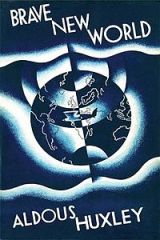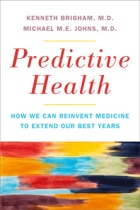Perhaps these two books represent different ends of the same pendulum. If that is the case, I can conclude that either a) insanity lies at both ends of the spectrum or b) I really just don’t like this pendulum.
 Brave New World
Brave New World
(1932) by Aldous Huxley
I always associate Brave New World with a race of super humans grown in test tubes and the chilling culling of those of us with genetic flaws. And with the even more chilling question of who gets to make the decisions regarding exactly what constitutes a genetic flaw.
When I decided to actually read the book, I had to come to terms with a slight inconsistency in my theory. Aldous Huxley wrote Brave New World in the early 1930s. At this point in history, Francis Crick was still in grammar school and James Watson was fairly recently out of diapers. That really changes my genetic interpretation of the whole situation.
Perhaps it was due to the fact that he wasn’t trying to answer the questions that I had been wanting him to answer. The role of women in his world didn’t sing to me, either. (Yeah, I tried to take it with a historical grain of salt, but it still didn’t convince me.) Although it is interesting to note that as the characters were enjoying their frequent and varied uncommitted relationships, Carl Djerassi was nine years old and the Mexican Wild Yam was unaware that it would change history.
I’d give Brave New World a score of 1.8 pharmacists. I think that it’s a good book to read due to the broad cultural influence. I found it an interesting reference point to measure history and ideas and change. Strikes me as a bit more of a high school English book than a book club book. Which might be another way of saying that I did resort to Cliff Notes for the second half of it. But hey, that’s 50% more than most of the people quoting it have read.
 Predictive Health: How We Can Reinvent Medicine to Extend Our Best Years
Predictive Health: How We Can Reinvent Medicine to Extend Our Best Years
(2012) by Kenneth Brigham and Michael M.E. Johns
I honestly found this book more frightening than Brave New World. At least Huxley knew he was writing about a dystopia. This book is complete and utter twaddle. (That said some of the best book group discussions have come from dreadful books. This could be one of them.)
The premise of the book seems to be that we all should be able to live to be 101 in perfect health before retiring to our beds and passing away peacefully in our sleep. And they spend 236 pages outlining how to do this.
I have been spending a lot of time and effort in the world of healthcare transformation. This does bring up a lot of discussions about a system that focuses on “sick care versus health care.” But the attitude of this book reminded me of Barbara Ehrenreich’s Bright-sided. She discusses this phenomenon of uncontrolled positive thinking which leads to this proposal that we can fix our healthcare system by replacing it with one where doctors don’t waste their time on sick people and treat healthy ones instead.
I give this book a score of one ticked-off pharmacist rolling over in her grave.
Recent Comments